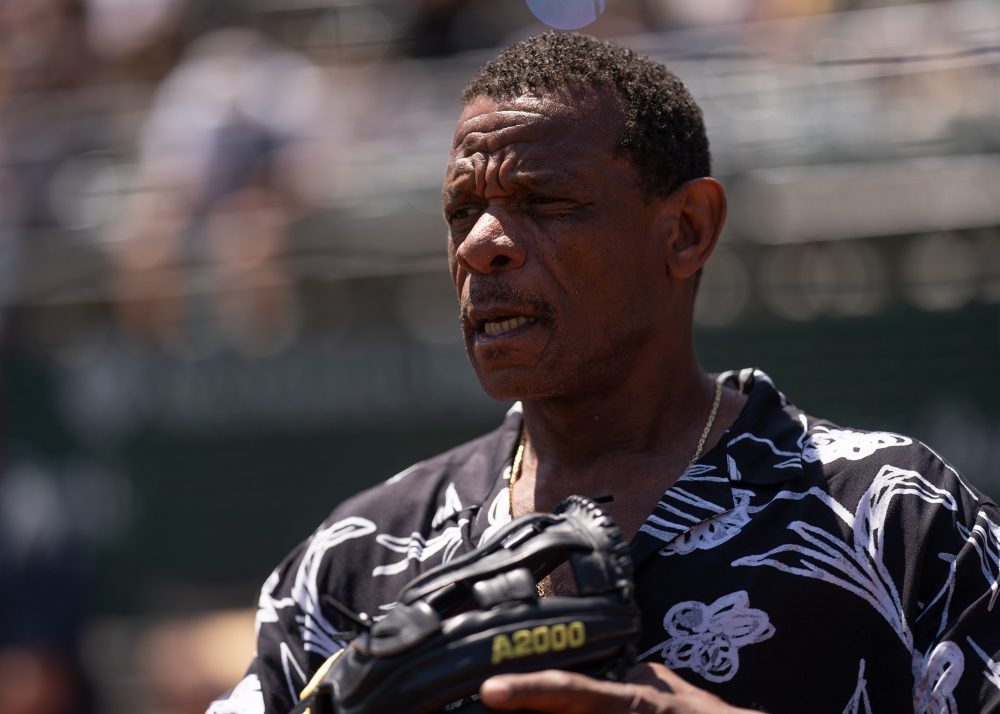
Picture credit score: © Stan Szeto-Imagn Photos
I realized a lot from watching Rickey Henderson. I realized important truths about baseball, in regards to the sang-froid that permits for informal greatness, about my very own father and his susceptibility to surface-level propaganda. I realized to look at my pen. A author with no pen is sort of a hitter with no bat, and Rickey had taken mine.
My solely private interplay with Henderson—and it was barely that—got here one gray morning when the Yankees’ Outdated Timers Day festivities had been delayed by rain. The baseball grampas had retired to the auxiliary clubhouse (actually the unique locker room, the pre-renovation den of Ruth and Gehrig) and have been simply killing time, typically in dialog with me. I needed to talk with Henderson—Rickey—not as a result of there was a selected matter I used to be pursuing, however as a result of I had by no means earlier than had the prospect to have interaction with the participant who had dominated the baseball of my New York-area youth, and I wasn’t going to go up the prospect. The issue was that Rickey wasn’t all that , so I stood subsequent to him with my recorder, pad, and pen on the prepared, and like Christopher Reeve taking part in Clark Kent, shuffled my toes and stuttered in his normal path, ineffectually attempting to get his consideration.
What Rickey actually needed to do was play hearts. He knelt on the ground and (if I recall appropriately) Ken Griffey père and Jesse Barfield joined him as he shuffled playing cards. As Rickey started to deal, Griffey reminded him that that they had no strategy to maintain rating. The best leadoff man of all time appeared up, noticed me, noticed my pen and pad, and prolonged his hand. Reflexively—who was I to say no to a God of the Sport?—I handed over each. He tore a bit of paper and handed again the pad. He saved the pen.
I watched as Rickey wrote out the names of the gamers on the web page. Did I politely wait out a sport of hearts, or quit? Then a tremendous factor occurred: I witnessed the Rickeyness of Rickey. Somebody walked previous—I by no means noticed who—and shouted, “Hey, Rickey!” Whoever it was should have mattered to him, as a result of he smiled and answered in form. One way or the other the momentary distraction fully derailed his practice of thought. It appeared to me that for a second he had no thought what he had been doing simply seconds earlier. He appeared on the pen in his hand as if he had no comprehension of the way it had gotten there. He appeared down on the piece of paper with a equally bemused expression. He appeared up at me, ready. He drew a logical conclusion: He autographed the web page and handed it to me.
I hesitated for an important second. Though I had seen different writers ask gamers to signal issues, I understood that this was thought-about a spectacularly unprofessional factor to do, an act that will get your press go revoked in case you have been noticed. The web page hovered between us for a protracted second, quivering within the air. My resolve to not take it weakened; I unclenched my hand and—however no, for in that second, Rickey remembered. Shaking his head like he was clearing an Etch-a-Sketch, he withdrew his hand, flipped the web page over to the clean facet, and rewrote the names of the gamers. I watched, bereft of each pen and Corridor of Fame signature, as the sport of hearts started. I by no means did get both of them again.
***
If you happen to adopted Rickey’s profession in actual time, then you definitely’re in all probability acquainted with the type of story I simply advised. Protection tended to be cut up between acknowledgements of his greatness and jokes about his eccentric, seemingly airheaded tendencies. What was hardly ever thought-about, if in any respect, was that one was predicated on the opposite. Rickey’s character and his multifarious areas of excellence between the foul strains went hand in hand. You possibly can no extra divorce his expertise from his character and count on him to have been the identical participant than you would subtract Ty Cobb’s depth and retain the 12 batting titles, or extract Babe Ruth’s joie de vivre and maintain the 12 home-run crowns. This was a participant who participated in additional major-league ballgames than anybody in historical past apart from Pete Rose, Carl Yastrzemski, and Henry Aaron, and in contrast to Rose he didn’t have the privilege of placing himself within the lineup. He merely took himself from group to group, a brand new one nearly yearly from the mid-Nineties on, not an All-Star or an MVP candidate however nonetheless retaining sufficient of his outdated abilities to be playable into his forties. Have bat, will journey—the stress may eat you alive in case you let it. He didn’t, and if any of it ever obtained to him he didn’t let it present.
Rickey was not above self-aggrandizement—he wasn’t precisely humble on the day he broke Lou Brock’s profession stolen-base document, and he in all probability shouldn’t have been—however in an age wherein some in public life are always reminding us of how nice they’re, the concept that one may simply play the sport at a excessive degree with out indulging in any performative nonsense about how they have been slogging their means by a grinding, joyless struggle is retroactively refreshing. Apart from, Rickey didn’t slog and he didn’t trudge. He burst. He nearly actually wasn’t the quickest participant within the sport primarily based on uncooked operating pace, however nobody was ever sooner on their first step out of their lead. Even the most effective baserunners must financial institution up a head of steam earlier than reaching their most. Rickey obtained there immediately. That was the 1,406-stolen base distinction.
“Retroactively” is essential, as a result of on the time, significantly within the Yankees years however often at different occasions as effectively, Rickey acquired an excessive amount of grief for not desirous to play—as a result of his hamstrings have been sore, or he had a headache, or he wasn’t mentally ready. I don’t know (and don’t care) if Lou Piniella was a Corridor of Fame supervisor or not, but when his therapy of Henderson in 1987 is holding him out of Cooperstown that will be a simply reward. In 1987 the new new baseball time period, courtesy of Piniella and George Steinbrenner, was “jaking it,” faking an damage.
“I need to play,” Henderson mentioned, “however my leg doesn’t let me play.” That ought to have been it—nobody ever questioned Don Mattingly’s again the way in which they questioned Henderson’s hamstrings—however the papers and the discuss radio hosts turned in opposition to him. The temptation is to see the distinction by way of complexion, a type of reflexive information of American life that some commentators have been in all probability aware of and a few weren’t, however it acted upon their perceptions nonetheless.
The mid-Nineteen Eighties have been not sure financial occasions. My father, immigrant striver, well-compensated when he labored however struggling to remain afloat in an unstable discipline as center age and altering know-how put him on the sting of obsolescence, absorbed a few of that hostility. He didn’t observe the sport intently however he absorbed the anti-Rickey commentary as a result of it was unavoidable. He would come across me watching that day’s Yankees sport, see Rickey plainly having fun with himself, and assume he was getting away with one thing. He would ask me why this jerk who clearly didn’t care about his career was making $1.5 or $2 million a 12 months—roughly $1.5 or $2 million a 12 months greater than he was making—when he labored so onerous.
I at all times tried to clarify. I advised my father how good Rickey was. At different occasions I pulled again the digicam and mentioned that ballplayers are like film stars, and if 50,000 folks a day purchased tickets to look at my dad work then he could be compensated at the next degree too. He would appear to get it—after which Rickey would chortle within the dugout, stick out his tongue for no specific cause, make a snatch-catch, or spend half an inning arguing with the followers within the left-field stands—after which my father would begin the argument yet again.
That was a quirk of my father’s character; he tended to not lose arguments as a result of even when he appeared to lose a degree he would press some type of psychological reset button and make you argue it yet again. This spring, almost 40 years later, as my father was dying, I attempted to resolve this argument. Rickey meant so much to me as a baseball fan, however I don’t assume he mattered to me a lot that I took the battle up once more as a result of I wanted my father to validate my opinion—I do know I used to be proper. It was, I feel, extra about the necessity to discover another patch of widespread floor earlier than we parted eternally. I advised him the now-famous Mike Piazza story about Rickey’s generosity with postseason shares—“Full share! Fuck that! You’ll be able to change any individual’s life!”—and ask him if that modified his opinion. He couldn’t say; his sickness had so degraded his reminiscence that he not remembered who Rickey was, or—extra painfully for me—our many, many conversations about him.
***
Some moments of grace stay eternally past us, however it’s pleasing to consider the whole lot that Rickey did after 1987 as his revenge, his rejoinder to Piniella and the New York media. An overdue MVP award got here after that, an entire e-book filled with information, Corridor of Fame enshrinement, and 1,899 extra video games—greater than Piniella performed in his total profession. (Candy Lou lastly realized to understand Rickey greater than a decade later, when he arrived at midseason to shore up an ALCS-bound 2000 Mariners membership. After Rickey left, Piniella found what a real head case appeared like, in new starter Al Martin.) Didn’t need to play? He needed to play so damned badly that he caught round till he was 44 after which went to the impartial Newark Bears and the San Diego Surf Dawgs. His dedication wasn’t reluctant, it was chic.
I realized a lot extra from Rickey, together with the contextual nature of the RBI (Don Mattingly in 1985 and 1986: Roughly the identical participant. Rickey had an off-year within the latter season and Donnie Baseball dropped 32 RBI; how can we account for this?) and a batting stance I futilely tried to mimic in neighborhood ballgames (it’s not simply crouching so that you’ve a strike-zone, as Invoice James mentioned, the dimensions of a cigarette packet; you additionally must have quite a lot of potential). I miss him as a participant so very badly, not within the typical means, as a result of I additionally miss my youth, however as a result of there isn’t a one else like him. There have been different nice gamers, however given his distinctive qualities nobody has been nice in the identical means.
I miss the duck beneath a excessive pitch that will have been on the letters for anybody else, the sudden explosion of the bat from a place seemingly too compactly coiled to provide a leadoff residence run, but so typically did. I miss my father. I miss my pen. This shedding and lacking is within the nature of issues till such time as it’s one’s flip to affix the misplaced and the missed. Figuring out that doesn’t make it any simpler to bear. Had been the universe simply, time would by no means have caught Rickey stealing. It’s onerous to think about that he would have acknowledged that it had any energy over him in any respect. That in the long run it did isn’t a shock, however so stark a reminder of inevitable destiny is sort of an excessive amount of to bear.
Thanks for studying
This can be a free article. If you happen to loved it, think about subscribing to Baseball Prospectus. Subscriptions assist ongoing public baseball analysis and evaluation in an more and more proprietary setting.
Subscribe now

















